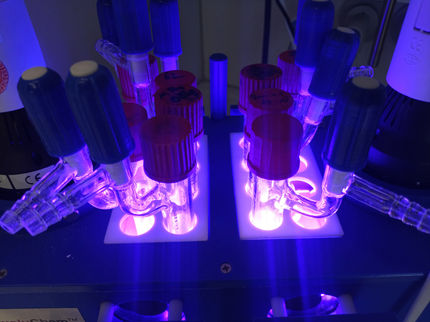Turbo-Packed RNA
Turbo Reagent Allows Precise Synthesis of tRNA Nucleosides
Ribonucleic acid (RNA) is a biologically important molecule that is very similar to DNA, the blueprint of life. Naturally occurring RNAs, such as transfer RNA (tRNA), contain modified building blocks (“nucleosides”), which are involved in decoding genetic information. Deazaguanosine nucleosides, in particular, are of significant interest for their antibacterial, antifungal, antiviral, and anticancer activity. In the European Journal of organic chemistry, Thomas Carell and his team at Munich's Ludwig Maximilians University (Germany) have now introduced a method to prepare tRNA nucleosides through a novel Turbo-Grignard-based approach with an unprecedented level of control from a common intermediate.
Because of the biological importance of deazaguanosines, a reliable method for their preparation is desirable. In this way, scientists can easily study their functions and the role they play in the treatment of diseases. One of the problems for synthetic chemists, however, is that these compounds often contain various reactive groups at several locations within the molecule. Precise control over the reactivity at a single position can therefore be difficult. Thus, the development of a site-specific reagent is required.
For their synthesis, the authors opted to use the versatile Turbo-Grignard reagent. The “normal” Grignard reagent is used by chemists to introduce a group into a molecule at a reactive site; it consists of the group to be added complexed to the metal magnesium. The Turbo-Grignard is also complexed to a lithium salt, which generally allows reactions to be performed under mild conditions – an important advantage when dealing with biologically relevant compounds.
In their article, the team shows that the Turbo-Grignard reagent has a specific point of attack and that it can be used in the presence of other reactive groups. Importantly, an adjacent group that proved problematic under different conditions was found to be completely unreactive to the turbo reagent, thereby allowing efficient synthesis of the desired nucleosides; the same reaction performed with the “normal” Grignard reagent resulted in decomposition of the desired products. The fact that other reactive groups in the molecule remain untouched facilitates the synthesis of deazaguanosine-derived tRNA nucleosides, which should enable detailed biochemical investigation of their functions in vivo and help in the treatment of genetic diseases.
Original publication: Thomas Carel et al.; "Efficient Synthesis of Deazaguanosine-Derived tRNA Nucleosides PreQ0, PreQ1, and Archaeosine Using the Turbo-Grignard Method"; European Journal of Organic Chemistry 2010.
Most read news
Topics
Organizations
Other news from the department science

Get the life science industry in your inbox
By submitting this form you agree that LUMITOS AG will send you the newsletter(s) selected above by email. Your data will not be passed on to third parties. Your data will be stored and processed in accordance with our data protection regulations. LUMITOS may contact you by email for the purpose of advertising or market and opinion surveys. You can revoke your consent at any time without giving reasons to LUMITOS AG, Ernst-Augustin-Str. 2, 12489 Berlin, Germany or by e-mail at revoke@lumitos.com with effect for the future. In addition, each email contains a link to unsubscribe from the corresponding newsletter.





















































